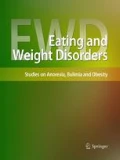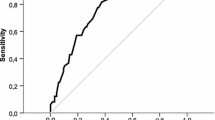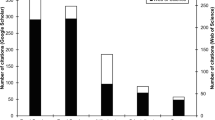Abstract
Purpose
Food cravings are common, more prevalent in the obese, and may differ in those who pursue surgical treatment for obesity. Food craving tools are most often validated in non-clinical, non-obese samples.
Methods
In this retrospective study, 227 bariatric surgery candidates at a large medical center completed the Food Cravings Questionnaire-Trait (FCQ-T). The aim was to explore the factor structure of the FCQ-T.
Results
Principal components analysis with varimax rotation revealed a seven-factor structure that explained 70.89 % of the variance. The seven factors were: (1) preoccupation with food, (2) emotional triggers, (3) environmental cues, (4) loss of control, (5) relief from negative emotions, (6) guilt, and (7) physiological response. The preoccupation with food factor accounted for 49.46 % of the variance in responses.
Conclusions
Unlike other populations, food cravings in bariatric surgery candidates appear to be related most to preoccupations with food.
Similar content being viewed by others
References
White MA, Whisenhunt BL, Williamson DA, Greenway FL, Netemeyer RG (2002) Development and validation of the food-craving inventory. Obes Res 10:107–114
Jarosz PA, Dobal MT, Wilson FL, Schram CA (2007) Disordered eating and food cravings among urban obese African American women. Eat Behav 8:374–381
Cepeda-Benito A, Gleaves DH, Williams TL, Erath SA (2000) The development and validation of the state and trait food cravings questionnaires. Behav Ther 31(1):151–173
Vander Wal JS, Johnston KA, Dhurandhar NV (2007) Psychometric properties of the state and trait food cravings questionnaires among overweight and obese persons. Eat Behav 8:211–223
Tiggemann M, Kemps E (2005) The phenomenology of food cravings: the role of mental imagery. Appetite 45(5):305–313
Moreno S, Rodriguez S, Fernandez MC (2008) Clinical validation of the trait and state versions of the food craving questionnaire assessment. Assessment 15(3):375–387
Abiles V, Rodriguez-Ruiz S, Abiles J, Mellado C, Garcia A, de la Cruz AP, Fernandez-Santaella MC (2010) Psychological characteristics of morbidly obese candidates for bariatric surgery. Obes Surg 20:161–167
Nijs IM, Franken IH, Muris P (2007) The modified trait and state food-cravings questionnaires: development and validation of a general index of food craving. Appetite 49:38–46
Crowley NM, LePage ML, Goldman RL, O’Neil PM, Borckardt JJ, Byrne TK (2012) The food craving questionnaire-trait in a bariatric surgery seeking population and ability to predict post-surgery weight loss at six months. Eat Behav 13:366–370
Gradaschi R, Noli G, Cornicelli M, Camerini G, Scopinaro N, Adami GF (2013) Do clinical and behavioural correlates of obese patients seeking bariatric surgery differ from those involved in conservative weight loss programme? J Hum Nutr Diet 26(Suppl 1):34–38
Ronchi A, Marinari GM, Sukkar SG, Scopinaro N, Adami GF (2008) Behavioral characteristics of severely obese patients seeking bariatric surgery: cross-sectional study with alimentary interview. Behav Med 33(4):145–150
Smith E, Hay P, Campbell L, Trollor JN (2011) A review of the association between obesity and cognitive function across the lifespan: implications for novel approaches to prevention and treatment. Obes Rev 12(9):740–755
Spitznagel MB, Garcia S, Miller LA, Strain G, Devlin M, Wing R et al (2013) Cognitive function predicts weight loss after bariatric surgery. Surg Obes Relat Dis 9:453–461
Goldman RL, Canterberry M, Borckardt JJ, Madan A, Byrne TK, George MS, O'Neil PM, Hanlon CA (2013) Executive control circuitry differentiates degree of success in weight loss following gastric-bypass surgery. Obesity (Silver Spring) 21:2189–2196. doi:10.1002/oby.20575
Weineland S, Arvidsson D, Kakoulidis TP, Dahl J (2012) Acceptance and commitment therapy for bariatric surgery patients, a pilot RCT. Obes Res Clin Pract 6(1):21–30
Barnes RD, Tantleff-Dunn S (2010) Food for thought: examining the relationship between food thought suppression and weight-related outcomes. Eat Behav 11(3):175–179
Goldman RL, Borckardt JJ, Frohman HA, O’Neil PM, Madan A, Campbell LK et al (2011) Prefrontal cortex transcranial direct current stimulation (tDCS) temporarily reduces food cravings and increases the self-reported ability to resist food in adults with frequent food craving. Appetite 56(3):741–746
Acknowledgments
This research was partially supported by the Menninger Foundation and McNair Medical Institute. Dr. Alok Madan is a McNair Scholar. The study follows the guidelines on good publication practices. The study sponsors were not involved in any aspect of the research activities and did not approve the specific protocol or manuscript. Thus, the authors were independent from study sponsors in the context of the research.
Conflict of interest
On behalf of all authors, the corresponding author states that there is no conflict of interest.
Author information
Authors and Affiliations
Corresponding author
Rights and permissions
About this article
Cite this article
Crowley, N., Madan, A., Wedin, S. et al. Food cravings among bariatric surgery candidates. Eat Weight Disord 19, 371–376 (2014). https://doi.org/10.1007/s40519-013-0095-y
Received:
Accepted:
Published:
Issue Date:
DOI: https://doi.org/10.1007/s40519-013-0095-y




